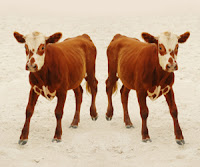 |
| Courtesy: www.supermarketguru.com |
Recently, a government poll in Canada found that only a small minority (16%) of Canadians found the use of cloning technology on livestock, acceptable. More than half (54%) of around 3000 Canadians involved in the poll, found the practice unacceptable. The poll on cloning was conducted by the government in Ottawa in order to finalise its assessment of food safety, animal health and environmental concerns arising from the meat and milk from cloned animals.
So what was it that made the cloned animals' food produce unacceptable? Was it because it was relatively of inferior quality as opposed to that obtained from naturally biologically produced animals? In 2008, the United States Food and Drug Administration and European Food Safety Authority had concluded that meat and milk from healthy cattle and swine clones and their progeny were safe for consumption. The report stated:
 |
| Courtesy: animalscience.ag.utk.edu |
If all is so hunky dory then, what exactly is the problem? The Center For Food Safety criticized the risk assessment report of the FDA, citing that adequate research had not been done and did not take into account the long term adverse effects of the cloned animal produce.Here are some excerpts from the news report from Center For Food Safety:
The FDA's veterinary medicine advisory panel rebuked the agency in 2003 for its position, declaring that not enough research has been done to determine whether food derived from cloned animals is safe. In fact, livestock cloning raises numerous health and ethical concerns. Over 90 percent of cloning attempts fail, and cloned animals that are born have more health problems and higher mortality rates than sexually reproduced animals.
The Center for Food Safety has called on FDA to ban the use of clones in food production until the food safety and animal cruelty problems in cloning have been resolved, and until public discussions have addressed the troubling ethical issues that cloning brings. We also call on FDA, in the event that these pre-conditions can be met, to require labeling of food from animal clones.
 |
| Courtesy:emagazine.com |
So the bottomline is that there ARE potential health hazards. If the cloned animals themselves are of weak constitution and are susceptible to health diseases (as numerous reports have already shown), then humans are definitely posing a threat to their own well being by consuming such animal produce.
I am of course not suitably qualified to comment on the biotechnological and health issues. I can only comment on the conflicting reports of two esteemed organizations. According to me, the CFS definitely came out with more detailed and numerous evidences to support its claim.
One thing that I could relate to was the animal cruelty and harm to the animal well being that the process of cloning entailed.If that was the case, then the ban is much called for as by consuming the 'cloned' produce, one is encouraging the unethical behaviour and cruelty to animals
Cloning no doubt has various advantages. For instance, cloning leads to an increase in the amount of food available(from the animals) with fewer resources required. That is beneficial for the rapidly increasing population. But for the long run, it has to be carefully analysed if the disadvantages would outweigh the advantages. Then it would not be about just one species getting affected, but all the other creatures comprising the cycle of which that one species is only a part of, getting badly hit.
Hence, this issue leads on to the larger question of whether cloning of animals itself should be banned.
No comments:
Post a Comment